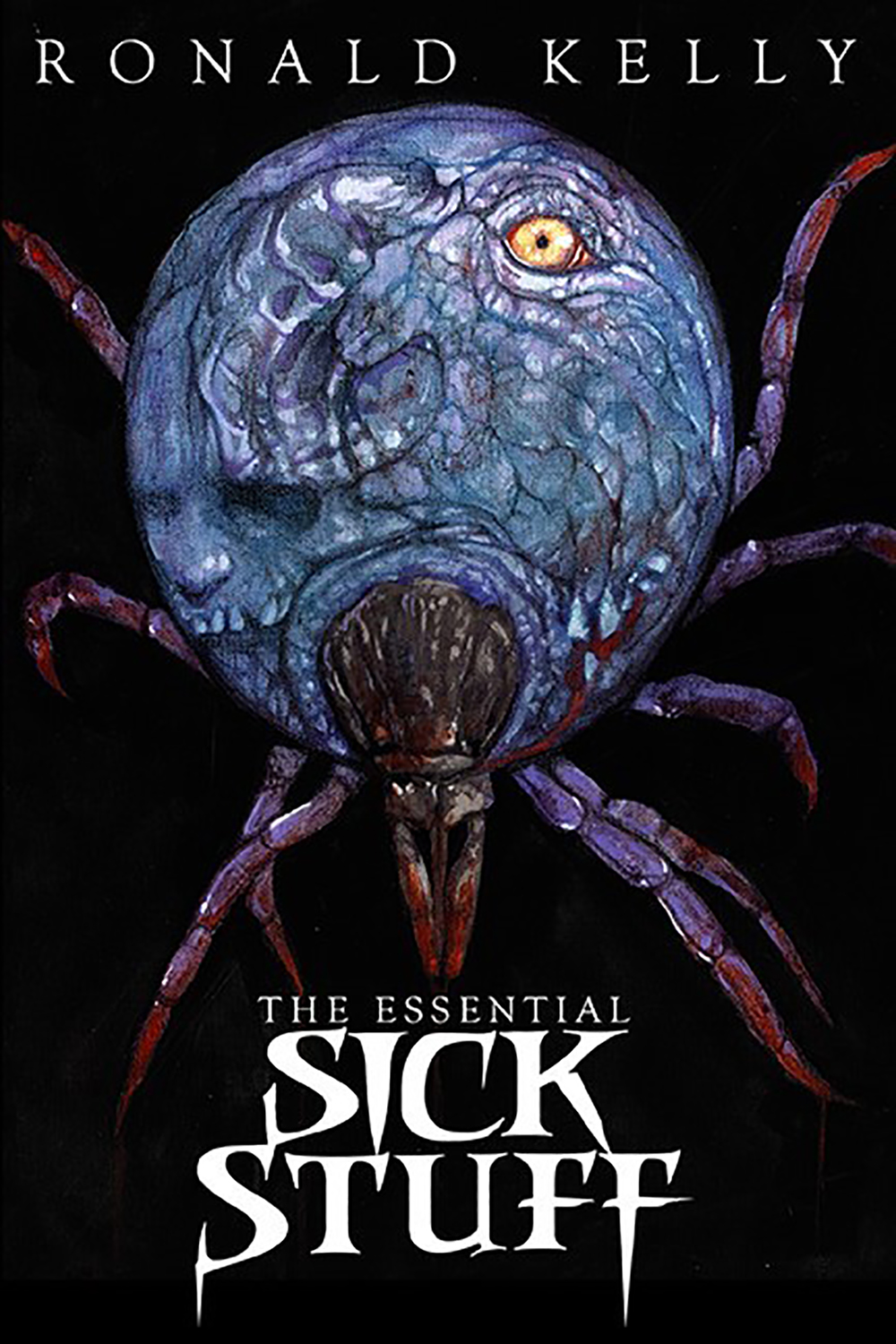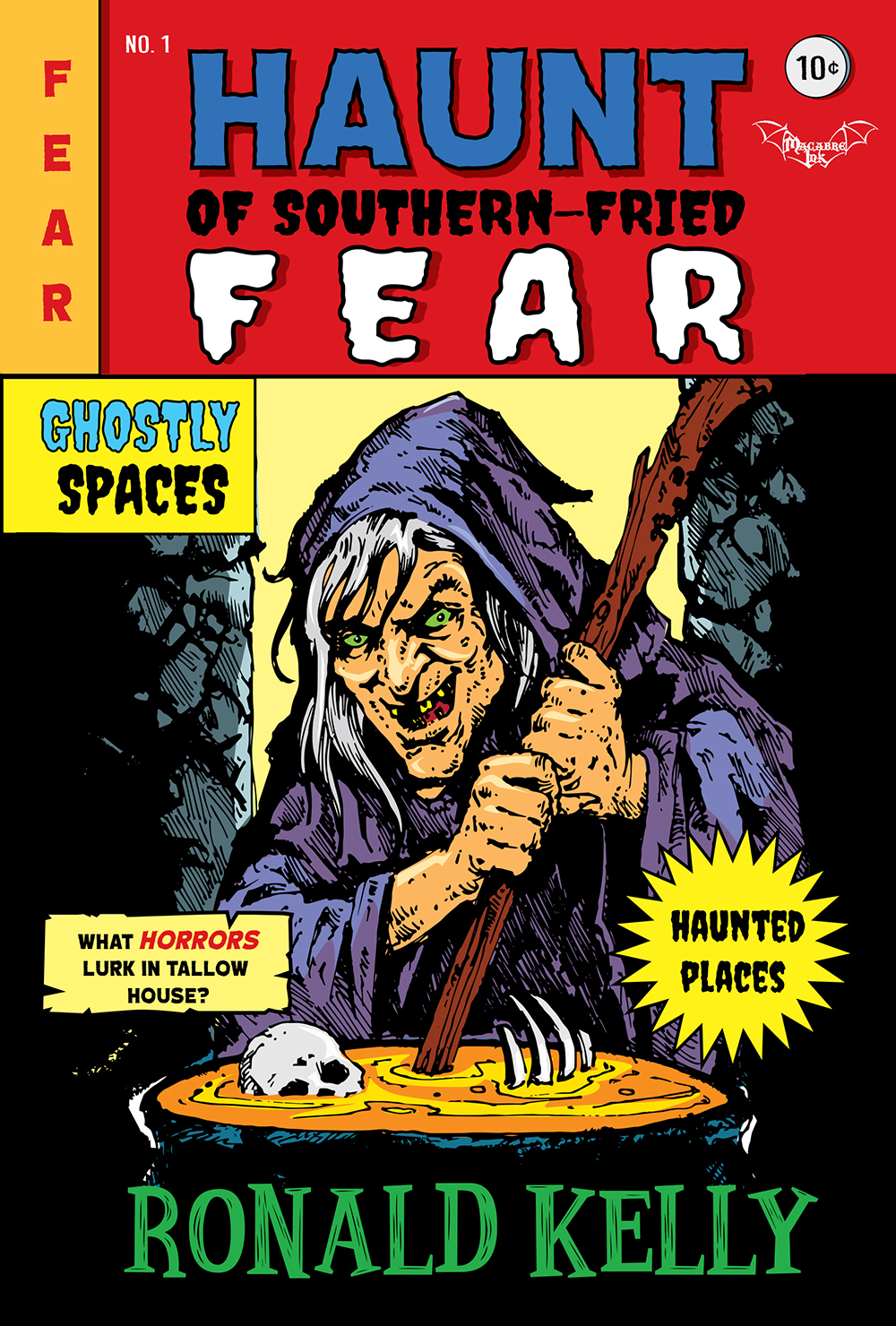For some time, I have been considering posting regular author interviews
here on ye old blog, and I finally decided to jump in and just do it. To
kick things off, the very sporting Ronald Kelly has agreed
to play guinea pig. I published several of Ron’s stories in
Deathrealm back in the day, starting
with his wonderful “The Web of La Sanguinaire” in Deathrealm
#6 (1988), which I loved at the time and still do. Since those long ago
days, he has gone from establishing himself in the field of dark lit to
taking a decade-long hiatus to returning and retooling himself and his
work. He has cultivated and retained a receptive audience with an
impressive body of work spanning several decades now.

GC: During the mid-to-late 1980s and early 1990s, your short
fiction was a mainstay in just about every publication in the dark lit
field. By way of Zebra, you also published a fair number of horror novels.
Do you have a preference for the short form over the long form — or
vice-versa — from the perspective of both reader and writer? You do both
quite adeptly. Do you find the disciplines for writing short fiction
significantly different from writing novels?
RK: By nature, I’ve always been a short story writer. The
compact form seems to suit my storytelling style extremely well. There’s not
a lot of fluff and filler involved; a scaled down plot, flesh and blood
characters that are real, but not with every mole, freckle, and scar
described, and preferably a twist end, sometimes ambiguously so. When I grew
up as a child, and well into early adulthood, I would listen to my Grandmama
Spicer spin tales of family history, Civil War lore, and horrifying stories
of local ghosts and cryptids. They were always very short and compact, but
told in a way that conveyed an encompassing sense of place and time. Maybe
subconsciously, I’ve emulated that in my prose. I do enjoy doing novel
length fiction, and the disciplines are very different. Writing a novel is
like taking a two week road trip from the east coast to the west. A short
story is more like a fast and fun day trip. Personally, I find a short story
much more pleasurable and rewarding.

GC: After Zebra crashed and burned in the mid-1990s, you retired from
writing, or at least publishing, for several years. During that period, did
you produce any fiction? Or did life carry you in a wholly different
direction? I know many — including me — were happy to see you blaze back
into action a few years ago. After the hiatus, did the writing/publishing
world seem a much different animal to you?
RK: When the Zebra horror line shut down in 1996, I found
myself in limbo. Writing mass market novels had been my job for six years
and suddenly I was unemployed. Since the “H-word” was pure poison and no
publishing houses were reading or accepting that genre of fiction at that
point in time, my agent suggested that I write anything but horror. So, I
tried my hand at several other genres, including detective and romance, even
children’s books, but nothing panned out. So, I got bitter and discouraged.
I flat-out stopped writing for ten years. And, even worse, I stopped reading
horror as well. I laced up my steel-toed boots and punched the clock… went
back to the factories. I pretty much figured that I’d had my shot at a
writing career and blew it. So, I worked blue collar jobs and raised a
family. It wasn’t until 2006 that I decided to come back to the horror genre
and give it another try. As for how the publishing world differed from
before, it was pretty much completely different. The sheer mechanics of the
writing process had progressed far beyond where I had left it. Where you had
to type and submit multiple copies and send them off via snail mail before,
everything was submitted digitally through email and where it once took
weeks or months to receive a reply, you could be accepted or rejected in a
matter of minutes. Also, social media made it easier to promote your work
and communicate with readers, fellow writers, and potential publishers.
Sure, there are pros and cons to Twitter and Facebook —
sometimes more negativity than positivity— but for the most part it’s a
useful tool to get folks interested in your work and build an audience of
readers.
GC: Your influences have ranged from the classic horror and science
fiction movies that so many of our (increasingly ancient) generation grew
up with to the works of Edgar Allan Poe, H. P. Lovecraft, Richard
Matheson, Stephen King, and many others (not that I’m saying you’re old or
anything — no, no, not at all!). Your recent collection,
The Haunt of Southern-Fried Fear, carries a strong EC Comics vibe
(and to me, especially with the art you’ve provided for the book,
something of a Hugh B. Cave/Lee Brown Coye feel, such as with
Murgunstrumm & Others). So, it seems you still have an affinity
for the “old” treasures. Once you returned to the writing fold, so to
speak, did you find yourself moved by any new and different dark
influences? Do you have any recent favorite books and movies?
RK: When I was debating on whether or not I actually wanted to write
horror again, there were two authors — both totally unfamiliar to me — that
pretty much made my mind up for me. After I read Brian Keene’s The Rising and James Newman’s Midnight Rain, they really ignited a creative fire in me and I thought “Hey, I think I
can do this again!” And I found that I actually wanted to. So I attribute my
desire to come back into the fold to Brian and James. As for recent books
I’ve enjoyed, there are almost too many to mention. I really enjoyed
Rich Chizmar’s Chasing the Boogeyman and the
Gwendy series he did with Stephen King. Also, about anything
by
Keene, Jonathan Janz, Wesley Southard, Hailey Piper, Laurel Hightower, and Eric Larocca. There are dozens of others, too. The horror genre
is so full of creativity and energy these days, the selection of different
styles and voices is hard to keep up with. As for movies, I don’t watch many
theatrical horror flicks these days, but some of the streaming services like
Netflix are putting out some good horror, like
Malerman’s Bird Box and Lebbon’s The Silence.
GC: I purchased The Haunt of Southern-Fried Fear literally a
day or two before Silver Shamrock blew up. After your experience with
Zebra, did you by chance get a nasty sense of of deja-vu? (I expect I
would have.) Am I right in thinking you’ve come to an arrangement with
Crossroad Press (with whom I’ve had consistently excellent experiences)
for your work that would have otherwise come out via Silver Shamrock?
Anything you can tell us about your upcoming stories and books?
RK: The fiasco with Silver Shamrock wasn’t as heartbreaking
and chaotic for me as it might have been for other authors. I’ve gone
through these sudden, unexpected publisher shutdowns seven times during my
writing career, so I reckon I’ve kind of grown accustomed to the chance of
it happening at any given moment. Nothing is guaranteed from day to day in
indie publishing. Sometimes it’s financial woes or low sales due to
disinterest from potential readers. In this recent case, it was an extremely
negative reaction to a social media promotion. Luckily, the Davids at
Crossroad Press contacted me shortly after SS announced their demise
and the transition of The Essential Sick Stuff, The Saga of Dead-Eye, and the Southern-Fried collection series from one publisher to
another was relatively smooth and painless. Crossroad is in the
process of making all three available in ebook and paperback, and eventually
audiobook… something that Silver Shamrock never seemed to have a
genuine interest in pursuing. As for upcoming books,
Dead-Eye, Book Two: Werewolves, Swamp Critters, & Hellacious Haints should be released
sometime this summer, along with a new edition of my extreme horror
collection, After the Burn, illustrated by Zach McCain. Plus, Stygian Sky is releasing
my memoir/writer’s guide, Southern-Fried & Horrified, in September.
GC: Most of today’s horror authors are finding career success in their
twenties and thirties. Your recent surge in popularity seems to be taking
place during your early sixties. Do you think there is a reason for that?
And, where do you see yourself and your career in ten or twenty
years?
RK: You know, there was a long stretch of several years after I
returned in 2006 where very few readers were familiar with me or my work. It
was discouraging. At one point, I seriously considered hanging it up because
of lack interest. Then folks started discovering Fear and reading
The Essential Sick Stuff and The Halloween Store, and they began to get a hankering for old fashioned storytelling. I don’t
know… maybe they grew a little weary of all the gloomy, angst-ridden fiction
that was prevalent and craved a bit of fun and nostalgia in their horror.
Maybe it just took thirty-six years for me to reach a point where I had the
confidence to write what I truly wanted to write; traditional tales that
serve as comfort food for those who have a true love for old-school horror.
Yes, true, I’m nearing retirement age, and that’s when many writers tend to
slow down and take it easy. It seems to be the opposite for me. I have more
story and novel ideas in my head, more projects in the works, than I ever
did during my younger days. If I can hang in there, I’m planning on serving
heaping helpings of Southern-Fried horror for another decade or two. If the
readers keep hankering for what I have to offer, I’m more than happy to
oblige them.
GC: Thanks, Ron — it has been a pleasure!
In the next Graveside Chat, look for celebrated author Jeffrey Thomas to offer his unique insights into
thrills, chills, and mind-numbing terror!




